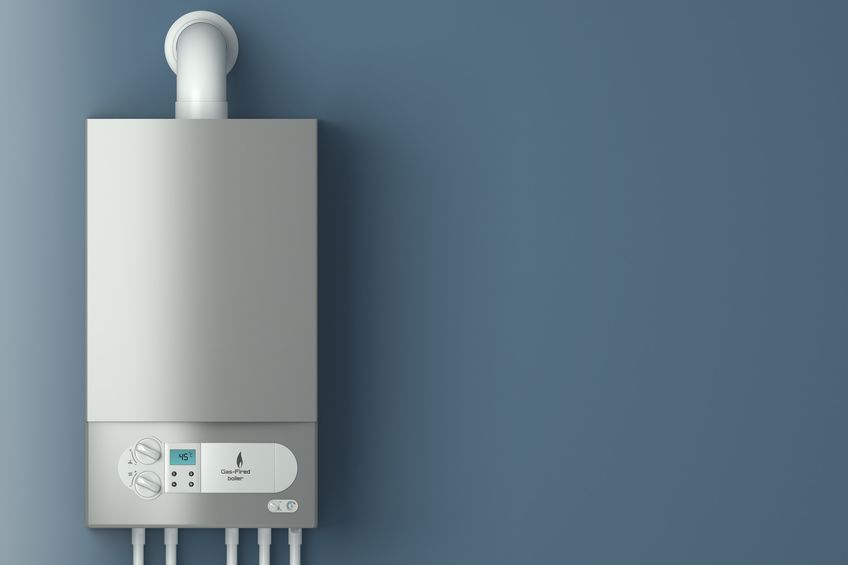A combi boiler is a water heater and a central heating boiler within a single unit. Hence the name ‘combi’. The system contains no hot water cylinder in the airing cupboard and no cold-water storage tank in the loft.
How does a combi boiler work?
The combi boiler receives water directly from the mains and heats it with something called a ‘heat exchanger’ whenever you turn on the hot tap/shower.
Because water is heated instantly when you turn on your tap, this makes them very energy efficient, since there is no need to heat an entire tank full of water when just a small amount is needed.
Combi boilers are now very popular in the UK and make up the majority of new installations. This is because they can deliver sufficient water supply for most small/medium households, they don’t take up much space and are simple to install.
What is the difference between a combi and condensing boiler?
The term ‘condensing’ refers to the way that the boiler works, rather than the type. So, any new combi boiler which you purchase today will also be a condensing boiler.
This is because all new boilers in the UK are now required to be condensing by law, which has been true for some years: http://www.nef.org.uk/knowledge-hub/energy-in-the-home/condensing-boilers
Condensing boilers offer much better efficiency than older style, non-condensing boilers. This means they are cheaper to operate over the long term and are better for the environment.
What size of combi boiler do I need?
There are several factors which determine the size of combi boiler you’ll need. These include the number of radiators, the amount of hot water you require, the number of bathrooms, the property size and how well insulated it is.
A combi boilers size means its output, which is measured in kW (Kilowatts).
In general, the more radiators you have and the more hot water you need, the higher the output required.
Below is a rough guide to the output of combi boiler you’ll need:
Small – Most flats & 1-2 Bedroom Houses:
Up to 10 radiators and 1 bathroom
24 to 27kw
Medium – 2-4 Bedroom Houses
Up to 15 radiators and 1-2 bathrooms
28 to 34kw
Large – 4+ Bedroom Houses:
Up to 20 radiators and 2-3 bathrooms
35 to 42kw
Combi boiler Brands
Viessman
Founded in 1917 and based in Allendorf, Germany. Viessman offers high quality, cutting edge products at competitive prices. In addition to boilers they also make other related products such as solid fuel burners and hot water cylinders.
Viessman Boiler Types: Combi, System, Regular
Worcester Bosch
Also referred to as simply ‘Worcester’ are based in the UK and have been established over 50 years. As well as boilers they manufacture solar panels and heat pumps.
Worcester Bosch boiler types: Combi, System, Regular
Ideal
With over 100 years’ experience in the field, Ideal have built a reputation for creating quality heating products. They also manufacture heating controls and hot water cylinders.
Ideal Boiler types: Combi, System, Regular
Baxi
Trading since 1866, Baxi is part of BDR Thermea which is one of the largest manufacturers of heating systems in Europe. They offer reliable, efficient boilers at a cost-effective price.
Baxi Boiler types: Combi, System, Regular
Vaillant
Established in 1874 and Remscheid, Germany. Valliant is a family owned business and a global leader in the sector. Their products are highly rated by engineers due to good performance and reliability.
Valliant Boiler types: Combi, System, Regular
Glow Worm
Operating as a brand name in the UK after being acquired by Vaillant Group in 2001, Glow-worm has been manufacturing boilers since 1934. Based in Derbyshire they offer reliable and highly efficient products.
Glow worm Boiler types: Combi, System, Regular
The pros and cons of choosing a combi boiler
Pros:
- Space saving: No hot water cylinder or cold-water tank needed in the loft. Ideal for smaller homes where space is limited.
- Unlimited hot water supply: Because the water is coming directly from the mains and being heated in real-time, you’ll never have to wait for a tank to heat up.
- Simple Installation: Again, because there are no tanks needs, installation is much simpler and usually costs less than traditional boilers.
Cons:
- You need good water pressure: Because combi boilers don’t use water tanks, you’ll be reliant on the mains water pressure. If you’re in a low-pressure area then this type of boiler may not be suitable.
- Won’t work with all showers: Specifically, power showers. Because they use a pump which needs to be connected to a hot water cylinder, which a combi boiler does not have.
- Not good for busy households: Since there is no hot water cylinder, if you try to run more than one shower/hot tap at the same time you may experience fluctuating temperature and/or pressure.
How much does a combi boiler cost?
The average cost of a new combi boiler will generally be anywhere in the range of £500 to over £2500 depending on the size and model (excluding installation).
The install cost for will vary depending on how complicated the installation will be and which area you live.
Combi boilers are usually cheaper to install than System or Regular boilers as there is no expansion vessel or water tanks required. However, if you are switching from a different boiler type to a combi or plan on moving the boiler to a new location, this will likely increase the cost.

